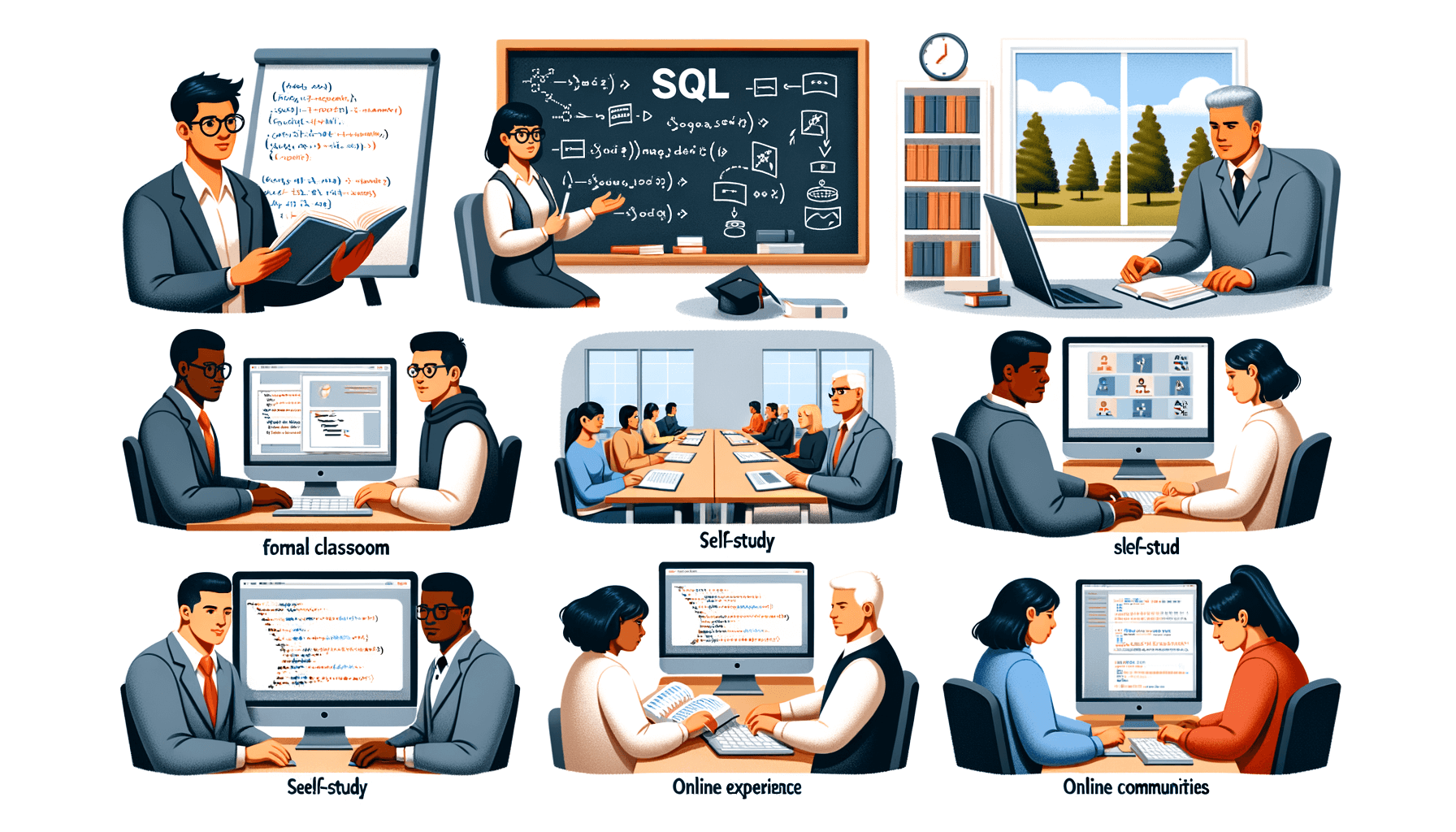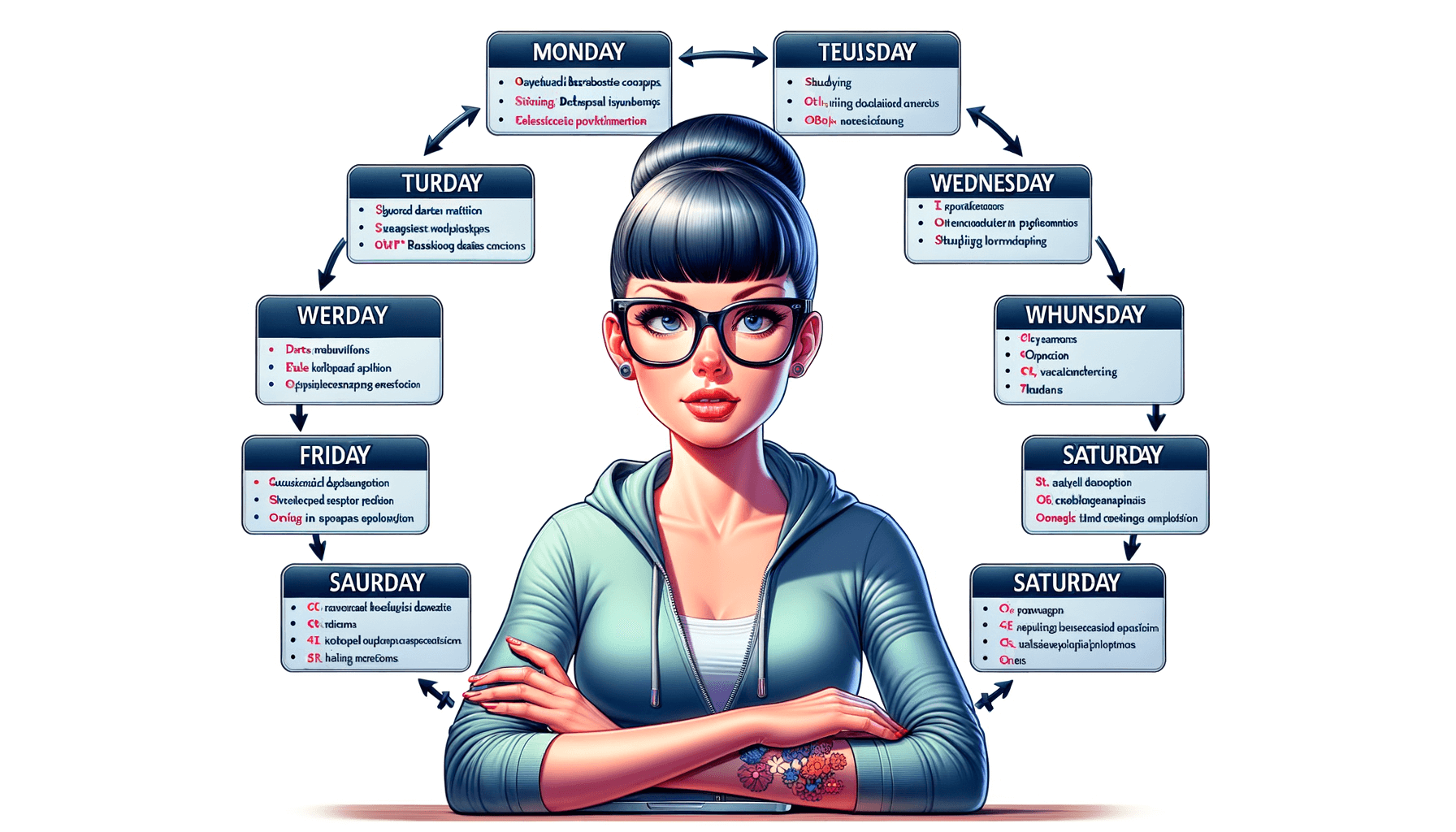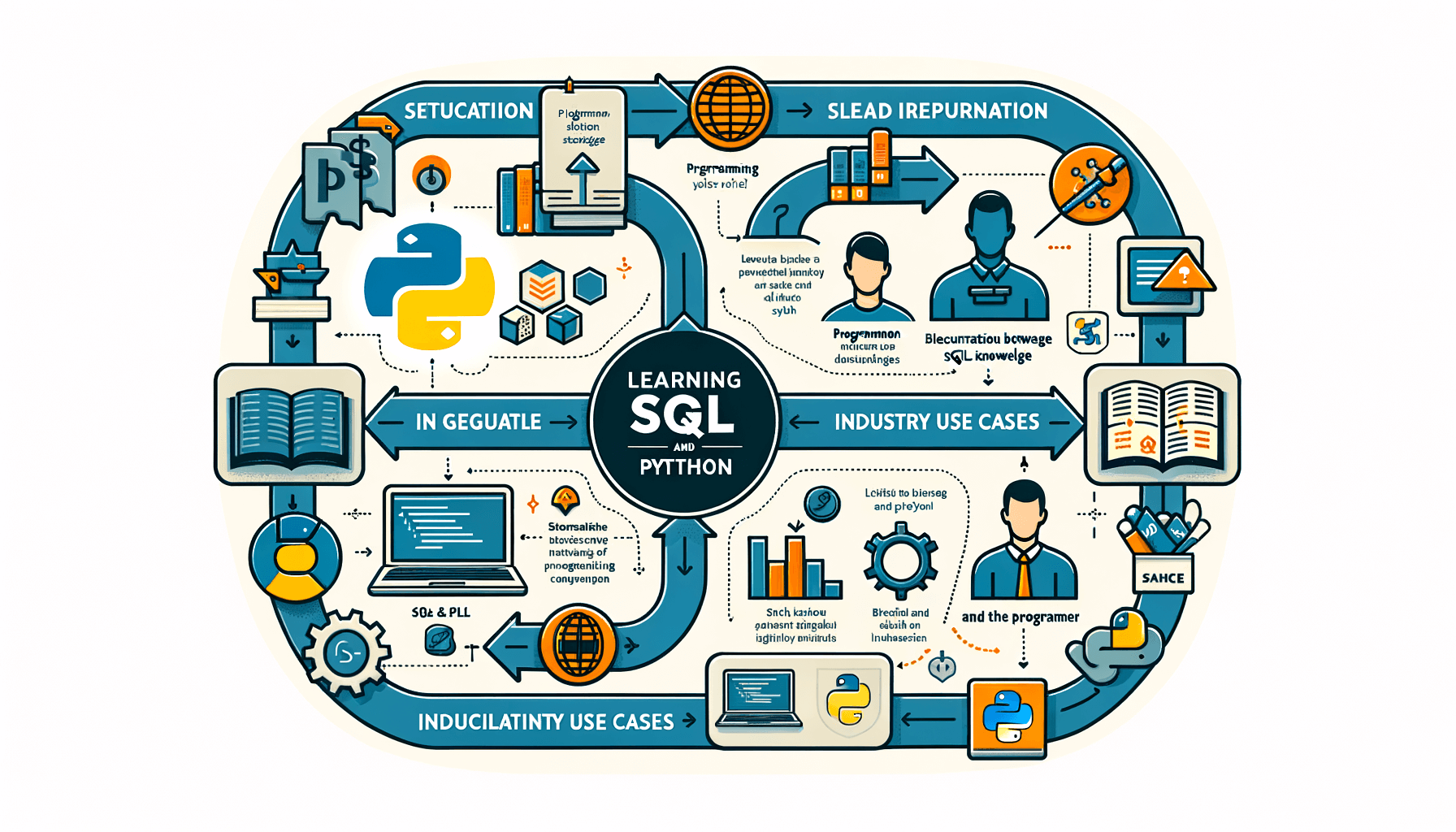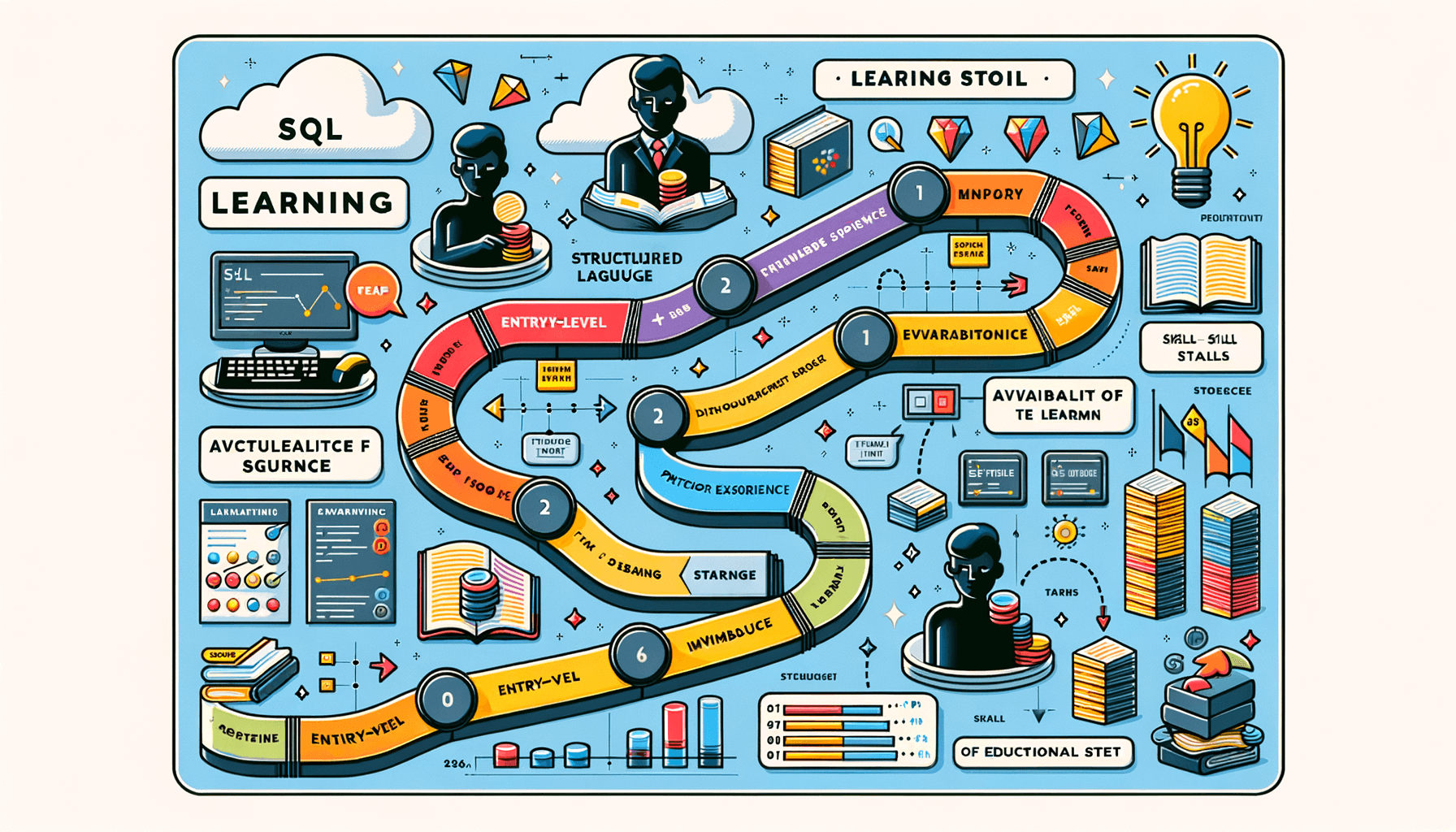A big variety of articles and resources

How did you learn SQL? Did you have a teacher?
 Sia Author and Instructor
Learn SQL
Sia Author and Instructor
Learn SQL
14 minute read
Learning SQL can be a different journey for everyone. Some people might have had a teacher, while others learned on their own. This article looks at the many ways people can learn SQL. We'll talk about formal education, self-study, professional experience, and more.
Key Takeaways
- Formal education, like university courses and online degree programs, can provide a strong foundation in SQL.
- Self-study methods, including books and online tutorials, are effective ways to learn SQL at your own pace.
- Professional experience, such as on-the-job training and mentorship, helps in applying SQL skills in real-world situations.
- Coding bootcamps offer intensive learning experiences that focus on SQL and often lead to quick skill acquisition.
- Online communities and forums provide valuable peer support, expert advice, and resource sharing for SQL learners.
The Role of Formal Education in Learning SQL
University Courses on SQL
University courses offer a complete database administration course where students can gain practical SQL skills. These courses often include hands-on projects and provide industry insights. The instructors, often with 25 years of experience, guide students through the effort required for success.
Community College Programs
Community colleges provide a more accessible option for learning SQL. These programs are usually shorter and more affordable. They focus on practical skills and often include real-world projects to help students apply what they've learned.
Online Degree Programs
Online degree programs offer flexibility for those who need to balance other commitments. These programs cover SQL in-depth and often include interactive elements like video lectures and forums. This allows students to learn at their own pace while still receiving a structured education.
Self-Study Methods for Learning SQL
Books and Textbooks
Books and textbooks are a great way to learn SQL at your own pace. They offer structured lessons and exercises that help build a strong foundation. Many books include practical examples and step-by-step guides, making it easier to understand complex concepts.
Online Tutorials and Courses
Online tutorials and courses provide a flexible way to learn SQL. These resources often include video lessons, quizzes, and interactive exercises. Many platforms offer both free and paid options, allowing learners to choose what fits their budget and schedule.
Practice and Projects
Practice is key to mastering SQL. Working on projects, such as building your own database or contributing to open-source projects, helps reinforce what you've learned. Regular practice also helps in understanding real-world applications of SQL, making you more proficient over time.
Consistent practice and hands-on projects are essential for mastering SQL. They help in applying theoretical knowledge to real-world scenarios, making learning more effective.
Learning SQL Through Professional Experience
On-the-Job Training
Learning SQL on the job is a great way to gain practical skills. Many companies offer training programs that help employees understand SQL through real-world tasks. This hands-on approach allows us to apply what we learn immediately, making the knowledge stick better.
Mentorship and Guidance
Having a mentor can make a big difference in learning SQL. A mentor can provide valuable insights and tips that are not found in textbooks. They can guide us through complex queries and help us understand best practices. This kind of support is invaluable for mastering SQL.
Real-World Applications
Using SQL in real-world applications helps us see its true power. Whether it's managing a database for a small business or analyzing data for a large corporation, real-world experience is crucial. It allows us to solve actual problems and see the impact of our work. This practical experience is often more valuable than theoretical knowledge.
Working on real projects helps us understand the importance of SQL in various industries. It also prepares us for future challenges by giving us a solid foundation in database management.
The Impact of Coding Bootcamps on SQL Proficiency
Intensive Learning Environments
Coding bootcamps offer a fast-paced and immersive way to learn SQL. These programs are designed to cover a lot of material in a short time, making them ideal for those who want to quickly gain skills. The structured schedule and focused curriculum help students stay on track and make the most of their time.
Curriculum Focused on SQL
Bootcamps often have a curriculum that is specifically tailored to SQL and database management. This means that students get to dive deep into the subject, learning both the basics and advanced techniques. The hands-on projects and real-world applications included in the curriculum help solidify the knowledge gained.
Success Stories from Bootcamp Graduates
Many graduates of coding bootcamps have gone on to have successful careers in tech. These success stories serve as inspiration for new students. The combination of intensive learning and practical experience provided by bootcamps can be a powerful way to jumpstart SQL skills and open up new career opportunities.
Bootcamps provide a unique environment where students can focus solely on learning SQL, with the support of instructors and peers. This can be a game-changer for those looking to quickly gain proficiency in SQL.
The Influence of Online Communities and Forums
Peer Support and Collaboration
Online communities and forums are great places for us to learn SQL. We can ask questions, share our work, and get feedback from others. This helps us understand SQL better and solve problems faster. Being part of a community makes learning more fun and less lonely.
Access to Expert Advice
In these forums, we can also find advice from experts. They often share tips and tricks that we might not find in books or courses. This expert advice can help us improve our skills and learn new techniques. Sometimes, experts even offer mini courses on specific topics, like SQL data manipulation tools.
Sharing Resources and Knowledge
One of the best things about online communities is the sharing of resources. Members often post links to useful articles, tutorials, and tools. This makes it easier for us to find the information we need. We can also share our own resources and help others in the community. This exchange of knowledge benefits everyone involved.
Online communities and forums are valuable for learning SQL. They offer support, expert advice, and a wealth of resources that can help us become better at SQL.
The Benefits of Certification Programs
Structured Learning Paths
Certification programs provide a clear and organized way to learn SQL. They guide us through the basics and then move on to more advanced topics. This structured approach helps us build a strong foundation and gradually master more complex concepts.
Industry-Recognized Credentials
Earning a certification gives us a credential that is recognized by employers in the industry. This can make our resumes stand out and open up more job opportunities. Having a certification shows that we have a certain level of knowledge and skills in SQL.
Preparation for Certification Exams
These programs also prepare us for certification exams. They offer practice tests and study materials that help us get ready for the real exam. This preparation is crucial for passing the exam and earning the certification.
Certification programs are a great way to learn SQL in a structured and organized manner. They not only teach us the skills we need but also provide us with credentials that can help us in our careers.
The Role of Personal Projects in Mastering SQL
Building Databases from Scratch
Creating databases from scratch is a great way to learn SQL. When we design and build our own databases, we get to see how different parts of SQL work together. This hands-on experience helps us understand the basics and more advanced parts of SQL.
Contributing to Open Source Projects
Working on open source projects is another excellent way to improve our SQL skills. By joining these projects, we can work with other people and learn from their experiences. This collaboration can teach us new techniques and best practices in SQL.
Developing Data-Driven Applications
Making data-driven applications is a practical way to use SQL in real-world situations. When we create these applications, we learn how to manage and use data effectively. This experience is valuable for anyone who wants to become a better SQL user.
Personal projects are a powerful way to master SQL. They offer hands-on experience, collaboration opportunities, and real-world applications that are essential for learning and growth.
The Importance of Continuous Learning and Practice
Staying Updated with SQL Versions
In the fast-paced world of technology, staying updated with the latest SQL versions is crucial. New updates often bring enhanced features, improved performance, and security patches. Keeping up with these changes ensures that we can leverage the full potential of SQL in our projects.
Advanced SQL Techniques
Mastering advanced SQL techniques can significantly boost our efficiency and effectiveness in handling complex data queries. Techniques such as window functions, common table expressions (CTEs), and recursive queries allow us to perform sophisticated data manipulations with ease. By continuously learning and practicing these techniques, we can solve more challenging problems and optimize our database operations.
Participating in SQL Challenges and Competitions
Engaging in SQL challenges and competitions is a fun and interactive way to sharpen our skills. These events often present real-world problems that require creative solutions, pushing us to think outside the box. Participating in such activities not only enhances our problem-solving abilities but also provides an opportunity to learn from others and stay motivated.
Continuous learning and practice are the keys to mastering SQL. By staying updated, mastering advanced techniques, and participating in challenges, we can ensure that our SQL skills remain sharp and relevant in an ever-evolving field.
The Contribution of Workshops and Seminars
Hands-On Learning Experiences
Workshops and seminars offer hands-on learning experiences that are hard to find in other settings. We get to work directly with SQL databases, which helps us understand the concepts better. These sessions often include practical exercises that make learning more engaging and effective.
Networking Opportunities
Attending workshops and seminars also provides valuable networking opportunities. We can meet other learners, professionals, and experts in the field. This can lead to new friendships, mentorships, and even job opportunities. Networking helps us stay updated with the latest trends and best practices in SQL.
Expert-Led Sessions
One of the biggest benefits of workshops and seminars is the chance to learn from experts. These sessions are usually led by experienced professionals who share their knowledge and insights. They can answer our questions and provide tips that we might not find in books or online courses.
Workshops and seminars are a great way to deepen our understanding of SQL. They offer practical experience, networking opportunities, and expert guidance, making them an invaluable part of our learning journey.
The Role of Academic Research in SQL Education
Studies on Effective Teaching Methods
Academic research plays a crucial role in shaping how we teach SQL. Researchers study different ways to teach SQL to find out which methods work best. This helps teachers improve their lessons and make learning SQL easier for students. Effective teaching methods can make a big difference in how well students understand and use SQL.
Research on SQL Learning Outcomes
Studies also look at what students learn when they study SQL. Researchers measure how much students know before and after taking SQL courses. This helps us see which teaching methods are most effective. By understanding learning outcomes, we can improve SQL courses to help students gain essential knowledge, versatility, and confidence in handling database tasks.
Integration of Research into Curriculum
The findings from academic research are often used to update SQL courses. This means that the latest and best teaching methods are included in the curriculum. When research is integrated into the curriculum, students benefit from the most up-to-date and effective ways to learn SQL. This continuous improvement helps students stay current with the latest SQL skills and techniques.
The Impact of Online Learning Platforms
Accessibility and Flexibility
Online learning platforms have revolutionized how we access education. They offer the flexibility to learn at our own pace and on our own schedule. This is especially beneficial for those who have other commitments, such as work or family. The ability to access courses from anywhere in the world breaks down geographical barriers and opens up opportunities for everyone.
Interactive Learning Tools
These platforms often come equipped with interactive tools that enhance the learning experience. Features like quizzes, mini-games, and discussion forums make learning more engaging. For example, a mini course on SQL query expansion can include interactive elements that help solidify our understanding of complex topics. These tools not only make learning fun but also more effective.
Popular Platforms for SQL Education
There are several popular platforms that offer SQL courses. Websites like Coursera, Udemy, and Khan Academy provide a wide range of courses, from beginner to advanced levels. These platforms often feature courses taught by industry experts, such as Eric Vanier, an SQL specialist who offers expertise in optimizing databases. Many of these platforms also offer free SQL courses, making education accessible to everyone.
Online learning platforms empower us to take control of our education, offering resources and tools that cater to different learning styles and needs.
The Influence of Peer Learning and Study Groups
Collaborative Learning Environments
When we learn SQL together, we create a space where everyone can share their ideas and help each other. This kind of group learning makes it easier to understand tough topics because we can talk about them and see different points of view. Working together helps us learn faster and better.
Peer Feedback and Support
Getting feedback from our peers is really helpful. When we show our work to others, they can point out mistakes we might have missed and suggest ways to improve. This support system makes us feel more confident and encourages us to keep learning.
Organizing Study Sessions
Setting up regular study sessions with friends or classmates can be very effective. We can plan what to study, share resources, and quiz each other. These sessions keep us on track and make learning more fun.
Learning SQL with others not only makes the process more enjoyable but also helps us understand the material more deeply.
Peer learning and study groups can make a big difference in how well you understand your school subjects. Working with friends helps you learn faster and makes studying more fun. Want to know more about how to improve your learning? Visit our website today and explore our courses!
Conclusion
Learning SQL can be a journey with many paths. Some people have teachers guiding them, while others learn on their own. No matter how you start, practicing regularly is key. Using online resources, books, and real-world projects can help you get better. Remember, everyone learns at their own pace. Keep practicing, stay curious, and you will improve over time.
Frequently Asked Questions
What is SQL?
SQL stands for Structured Query Language. It's a programming language used to manage and manipulate databases.
Can I learn SQL without a teacher?
Yes, you can learn SQL on your own using books, online courses, and tutorials.
How long does it take to learn SQL?
The time it takes to learn SQL can vary. Some people pick it up in a few weeks, while others may take a few months.
Are there free resources to learn SQL?
Yes, there are many free resources like online tutorials, YouTube videos, and community forums.
Is SQL hard to learn?
SQL is not very hard to learn, especially if you have some background in programming. With practice, you can get better at it.
Do I need a computer science degree to learn SQL?
No, you don't need a computer science degree to learn SQL. Many people learn it through online courses and self-study.
What kind of jobs require SQL skills?
Jobs like data analyst, database administrator, and software developer often require SQL skills.
Can I practice SQL at home?
Yes, you can practice SQL at home using your computer. There are many tools and online platforms where you can practice writing SQL queries.
Related Articles

Can a programmer master SQL in a week?
13 minute read

Do I still need to learn SQL if I already know Python?
13 minute read

How Long It Takes to Learn SQL: A Comprehensive Guide
10 minute read




